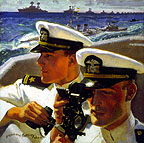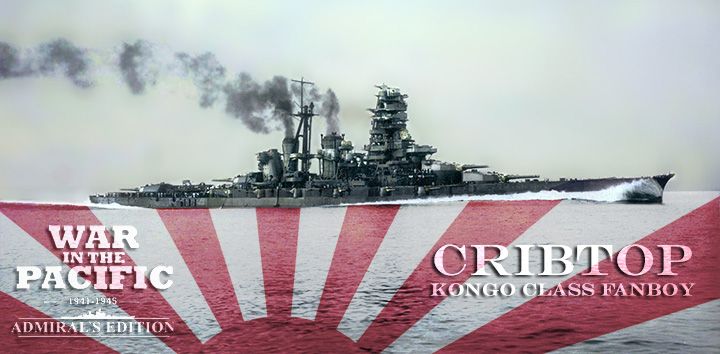Nemo121
Posts: 5821
Joined: 2/6/2004
Status: offline

|
vettim89,
Aye, the Suez counterattack was a pretty good example of an army striking deep for a strategically important geographical target which would dislocate the entire front line. It also featured elements of operational and quasi-strategic air usage but benefited significantly in that the Eqyptians didn't really ever get a mobile armoured strategic reserve going. But as an example of something quite resembling a Deep Battle I think it shows how cutting through operational lines of communication, preventing lateral movement along the front and disrupting command, communications, local and operational reserves etc worked together to collapse a front relatively cheaply ( once the initial breakthrough was made ).
As to the Syrians. Well the problem with the Syrians was that while they tried to strike deep they didn't actually follow Deep Battle doctrine because they really didn't do anything to stop the gathering and dispatching of Israeli operational and strategic reserves. When you look at that battle the committment of the Israeli tactical/operational reserves slowed the advance and stopped it in several places and their strategic reserves halted the breakthroughs which did occur. If Syria had dropped persistent nerve agents on the locations of stockpiles of Israeli armour which the reserves would mate up with the imposition of even a 12 hour delay in sending those forces forward would have allowed Syrian spearheads to reach those armour stockpiles and capture them.
Of course, rather amazingly, the Syrians didn't have any plans to target those armoured reserves ( while they were most vulnerable, sitting in warehouses etc waiting for their reservists to match up with them ) with either conventional or non-conventional means and didn't make armoured drives at those stockpiles ( even as contingencies ) a high priority. They left the enemy's strategic reserve utterly unbothered by anything - not even long-range artillery ( which they committed to the tactical and operational fight instead ) - and were, as one would expect, defeated by those reserves as they made it into action. They, instead, relied on their pace negating those reserves and, really, that's not a good idea. In Central Europe the Soviets weren't going to rely on pace to negate Operation Reforger. No, they were going to rely on pace backed up by GRU-guided Spetsnaz operations, massed FROG strikes, airstrikes and, in quite a lot of the variants of their warfighting plans, either a mix of non-persistent and persistent nerve gas agents or nukes. Nothing says "I don't want that Bn of tanks warehoused there to interfere with the OMG like a 20 Kt ground detonation in the middle of their warehouse."
Personally I think they'd have hit the warehouses with persistent agents and then intermittent additional dustings of agents which broke down the integrity of filters - guaranteeing a rapid attrition of the number of available gasmask filters and massed casualties in future intermittent strikes. As to how they'd have timed those intermittent raids? Well, 1 GRU agent or spetsnaz team holed up in an apartment nearby could fairly rapidly spot the arrival of troops trying to ready the warehoused vehicles and/or REFORGER units. I always, personally, felt that the ability to mate the REFORGER units up with their equipment free of interference once the chemical threshold had been crossed was overestimated by Western forces.
Hartwig,
I like the Triandafillov quote. I'd also point out that when he talks about operational shock or system paralysis he is talking of the military system's inability to react to the new situation and/or react as rapidly as the situation is changing. Sounds pretty familiar to Boyd's OODA loop doesn't it? Also when he talks of the disintegration of the operational system he is talking of the disintegration of the lines of communication, supply and command. An Army of 200,000 men split into 200 groups of 1,000 men each without communication to outside elements, access to resupply or reliable command is nothing but a rabble waiting to be pursued and run down or thrown into prison camps.
Wirraway_Ace,
Yes I do believe it was. I think it gave the model clarity and an ability to operate at a higher operational tempo with clearer and more rapid decision-making than a doctrine which focussed on enemy force destruction - which necessitated many halts while recon elements fed back enemy locations and HQ digested these, issued new orders and, basically, completed the Observation, Orientation and Decision portions of the OODA loop.
Don't forget though that the geographical objective was NOT an end in and of itself. Taking that geographical objective was the military objective which would bring about the paralysis and collapse of enemy command, supply and communication elements throughout the enemy's operational depth and the dislocation of the enemy front line forces. So, the graography was a means to an end, not the end in and of itself.
I think one way of illustrating the difference between Deep Battle and Blitzkrieg was that the Soviets were determined to avoid throwing away a potential strategic victory by allowing their exploitation forces to get caught up in the operational battle zone pocketing individual regiments and divisions ( sub-operational and sub-strategic level forces ) and delaying so long sewing them all up that by the time that issue was settled the potential for a drive into the strategic depth had been prevented by the redeployment of enemy operational and strategic reserves.
The Germans weren't, doctrinally, as bothered by the desire to prevent their exploitation forces fighting the break-in battle OR the need to prevent them from getting bogged down in the operational zone. The end result of this was that many German Panzer divisions wasted large portions of their armoured fighting power conducting the break-in and then ended getting caught up in sub-operational and operational level battles designed to pocket a regiment here, a Brigade there, a Division elsewhere. Sure it looked pretty good and ended up yielding large hauls of prisoners etc BUT at what opportunity cost? In much the same way as the Vietnamese replied to American statements that American soldiers had never lost a battle in Vietnam by stating, "That's true, it is also irrelevant." I believe the Soviets would have told the post-WW2 Wehrmacht that while the Wehrmacht acheived brillitant tactical and operational feats right up until the end of the war what mattered was the Strategic level, at which the Soviets excelled from mid-43 onwards. Brilliant tactics and operations win medals and get written about in books or docudramas on the History Channel. Good, solid, focused, relevant strategic objectives arrayed in a logical sequence designed to achieve viable national policy objectives win wars. The Germans had the former. The Soviets had the latter. We know which side won the war.
This is why I think Deep Battle was superior to Blitzkrieg. It kept its utter focus ruthlessly on the Strategic Objectives, never allowed its focus to waver and sacrificed operationally and tactically in order to maximise the possibility of achieving strategically decisive objectives. It also accepted the reality that to everything there is a cost and to achieve the requisite pinning actions and breaches in the enemy front lines the PBIs ( Poor Bloody Infantry - and more modern equivalents PBMIs ) would suffer huge losses. If it achieved a breach into which they could inject a cohesive, unattrited operational manoeuvre group tasked with clear, decisive objectives then that was a price they were willing to pay.
Echeloning with a clear focus on geographical objectives allowed greater clarity and rapidity of decision-making IMO through focussing on making the enemy react to what you did - immediately putting them on the back foot of the OODA cycle. In addition I think if you look at the Soviets they clearly had Europe divided up into "strategic leaps" - which isn't a doctrinal term but is a term I always found useful when discussing that distance which a Soviet Army reasonably expected to be able to/have to drive in order to gain the next significant strategic objective which would dislocate and collapse the enemy front.
< Message edited by Nemo121 -- 10/3/2011 7:53:37 PM >
_____________________________
John Dillworth: "I had GreyJoy check my spelling and he said it was fine."
Well, that's that settled then.
|
 Printable Version
Printable Version









 ), I would add a personal (perhaps I should say psychological, but there are more expert people around as well
), I would add a personal (perhaps I should say psychological, but there are more expert people around as well  ) meta-comment not on the doctrines but on our perception thereof.
) meta-comment not on the doctrines but on our perception thereof.  ...
... 




 New Messages
New Messages No New Messages
No New Messages Hot Topic w/ New Messages
Hot Topic w/ New Messages Hot Topic w/o New Messages
Hot Topic w/o New Messages Locked w/ New Messages
Locked w/ New Messages Locked w/o New Messages
Locked w/o New Messages Post New Thread
Post New Thread